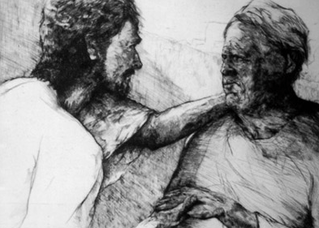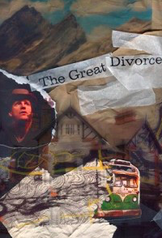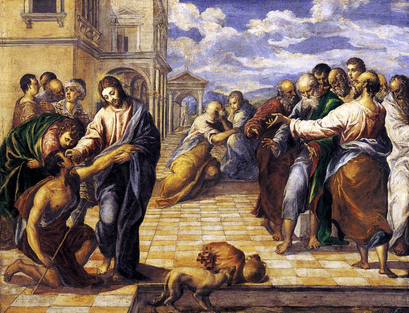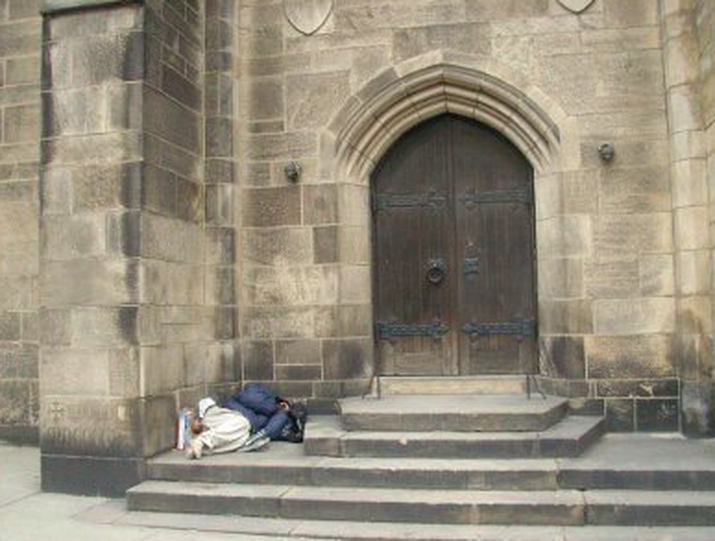 I am jumping ahead a bit in my thread on the Sermon on the Mount, but, there is something very narratively-interesting (yes, I made up a word here) about what story Matthew chooses to come right after, that is, to immediately follow the Sermon on the Mount. He could have picked from dozens of known Jesus-encounters or teachings, but this is the story he choose for us to hear right after the Kingdom-inviting-and-living-righteously-sermon that began at 5:1 and concludes at 7:29. Here is the text of Matthew's post-Sermon on the Mount thread. Afterward, then, please note with me a few narrative inferences that seem very applicable to the church that stands in front of the narrative. (That's us!)
First, note this is purposeful (i.e., a calculated choice by Matthew), for there is a connection to the “crowds” from the the beginning, whom Jesus was ministering to at the start of the Sermon (4:23-5:2). This is Matthew's way of connecting the Sermon to the encounter Jesus will have at the head of chapter 8. The reader is not to disconnect the Sermon on the Mount to this following event, thus leaving the reader to ask, what is the significance of the leper in this narrative to what we just heard from Jesus on that mountain? Second, Jesus had just made an invitation into his kingdom and explained what righteousness was, not only required in this kingdom, but was, also, to flow from living out the kingdom and his first encounter is a leper. This, of all people in the land, is certainly one of the target groups of the Beatitudes (poor in spirit, mournful, meek/powerless), a much marginalized social class, and very unclean. Third, note that Jesus touched the leper before he healed him—significant, because you don’t touch lepers and if you do, you share in their uncleanness (get it?). Then, finally note, the kingdom is realized when “immediately” the leper was made clean. You must remember that pure of heart in 5:8 is actually [socially, religiously] “clean of heart.” So there is a definite narrative pun (connection) here for the reader to catch. This narrative was no interruption, but was the sermon's application. Now go and do likewise.
0 Comments
 Recently I was drawn back into a discussion on one of the best books ever, well, best books, anyway, by C. S. Lewis, The Great Divorce. Still, one of my old time favorites. The book, simply, is a story that reflects on the realities of heaven and hell. The narrator finds himself in a “Grey Town,” a joyless, very grim city, where it is always raining—even indoors. In the story, Lewis describes hell as an ever living, separation from God, moving further and further away from God’s love. Yet, it is even worse in Lewis’ depiction: Hell is also moving further and further away from each other. Isolation becomes the destiny of Hell. Dante picks up a similar track with his depiction of the circles of hell, in that the lowest, furthermost away from God, the last and most inner circle of hell is not one of fire, but of ice, a frozen lake where the rays of God’s love are completely gone. This is truly a masterful depiction (from both Lewis and Dante) of what Hell is like. So often, people with very shallow understandings of Christianity like to say of hell, “Well, at least my friends will be there.” There is a problem with this: if heaven and hell are best explained by the gospel and of heaven where the gospel will be revealed in its fulness, hell, then, is just the opposite.  The Lewis-Dante depictions are not unrealistic nor far fetched. If the gospel moves us first toward the the payment for sin—which is separation from God—and then, even now, draws a community together so that they may love one another, then Hell is the total opposite, the final separation from God and His love and separation from one another. No wonder much of the New Testament pictures the outworking of the cross as fellowship among strangers and unequals, a fellowship where no one is to be isolated. The church, a local church in a place, is the picture of God come in Christ, which is a way of seeing and experiencing heaven on earth, even if only in part. Fellowship matters. Church matters. If you are trying to live a Christianity apart from church, there is no way around it, you are in a living hell (living totally the opposite of the gospel). On a path of isolation and separation from God. Sounds harsh. Certainly. But this notion that a Christianity apart from a local body of Christ is a false, hellish notion. No wonder the writer of Hebrews (which I believe was Luke) says:
We, now, live in “Grey Town” as we try to make our way upon the earth. And, so much of earth's social and cultural systems are to drive us toward separation from one another. Yet, God has set up in the midst of these “Grey Towns” small enclaves of heaven, certainly not perfect but always perfecting the maturity of the saints and strengthening the fellowship of believers so they may, indeed, one day fully know Christ and fully experience the fellowship of the saints—and that will be heaven.
 Some vulnerability here: Being short and (I’ll say it the old way) a bit husky when I was a child and teenager, I had to work harder to get picked for sports teams, run, not faster, but for longer, hustle more, and put up with multiple injuries and still keep up to get off the bench. (After years of being last picked for most school or neighborhood pick-up games before high school, I was a started on the Varsity Soccer team in high school for 3 yrs.) This disadvantage and barriers gave perspective that carried over into adulthood in that I had to be smarter, be more prepared, and work harder than other (taller) guys because short guys are just not noticed as much. In my adult years, I could be talking to someone—whether at the office, out at a gathering, even at church—and someone taller would come along and just start talking to the person I was having a conversation with. Totally looking over me as if I was n’t there. Not only that, in all the years this has been happening—like since I was in my twenties—the persons I was having conversations with never even said anything like, “Excuse me, I am talking with someone.”  I believe this is one reason I struggle with those that don’t have to work (too hard) to get things. Get jobs. Promotions. Cars. Awards. Ok, I don’t really care too much about awards . . . but . . . When I was in college, I had a pretty good GPA and was very (very) good in Greek. I even taught for some of the professors when they were unable. I had my eye on one award. Just one. The Zondervan Loose Leaf Greek Bible given to the top senior Greek student. There was little doubt I was getting it. I was a senior. I had the best Greek grades. And . . . my name wasn’t called. A Junior got it. Wait! What? That’s not right. But that is exactly what happened. They gave it to someone who wasn’t even graduating that year (that Spring). That was very hard to take. I rarely care about such accolades and awards (really I do don't care), but this one I did. O, come on . . . really, I didn't get it? I once was told by a psychologist, in my mid-adult years, that I had a warped sense of justice. You think? I don’t like it when I see someone treated unjustly. Unfairly. Even small subtle things like people getting to go into a newly opened cashier line ahead of others who have been waiting longer. That’s just not right. Right? I speak up. You betcha I do. And, don’t get me going on the bigger things. But that’s more complicated for a personal ranting blog post. I once thought I was gonna be a lawyer. But God had other plans. (Okay, I confess that have been asked for my autograph . . . mistaken for Danny DeVito, the actor . . . I really have.) I have had to deal with losing everything a few times in my adult life. Having to start over in a new vocation three times because of an unjust act or treatment . . . but I again worked hard, focused, and rebuilt . . . and still hated (and hate it) when I saw (when I see) some people just get to cut in line and not have to work for what they get. So, now you know me a little better. And, perhaps why I think the way I think and do the things I do.  "And the Lord spoke to the fish, and it vomited Jonah out upon the dry land" (Jonah 2:10). In my Easter sermon (from the Matthew 12 passage where Jesus uses Jonah as a sign), I asked our morning congregation, "Whom do you identify with in the Matthew Jonah-Jesus story?" The disciples? Good choice. A bit confused. Often failing. But learning and staying faithful to Jesus. Jesus? Well, that's too easy. And if you picked Jesus, then you don't identify with Jesus. Just saying. The pharisees? This is the group that opposes Jesus. Scared. Annoyed. And, threatened by Jesus' presence . . . ready to get rid of this nuisance. we should identify with these characters, for we have pharisee hearts. The crowd? Following Jesus around–sometimes for Jesus, sometimes against him. A mixed bag. Certainly curious. Benefiting from Jesus' miracles. But, also liking Him because he be "speaking truth" to our oppressors, to the man, against the system . . . Many are in this group, but it is still self-seeking, self-preserving (and for good reason, too), hoping for a resistance leader to arrive . . . yet it is the crowd that benefits from Jesus' presence and will be the group to respond to the gospel first . . . after the resurrection . . . this is a fair and a good choice. Jonah? Running from God, 180˚ from where God is calling me. Yes. This is me. Fess up, people. Plus, why in world would I want to preach to those mean, savage, cruel Ninevites? They be our enemies. If I preach to them there is a good chance You will show mercy on them. (And that's exactly the original story in the OT–and mostly why Jesus uses the Jonah story as a sign to the Pharisees. Do you get that now?) A parallel to the scribes and Pharisees. An excellent choice. The Ninevites? This is my choice. I was an enemy of God, and while I was yet a sinner, Christ died for me (cf. Romans 5:8). Yes. The group, i.e., the character, in the story that gets mercy . . . that's what I want to be. (That's what I need.) Need to recognize I am (was) an enemy of God, but that he showed me mercy . . . Okay. You can tell there should be recognition that we are some and all of these in some way (except for identifying as Jesus, of course). So, whom do you identify with in this sign . . . you looking for a sign . . . you can't handle a sign . . . truth!
 Some post Easter streams of consciousness (mixed with a little Game of Thrones from last night's episode): “Our enemy doesn’t tire, doesn’t stop, doesn’t feel.” The first Easter was revealed, quietly, away from most public eyes. Those with no standing in society, its only testifiers, its only witnesses. (The women if you're trying to guess whom.) And this got me thinking, last night, with season 8, episode 2 of Game of Thrones there was an interesting juxtaposition to our memory of that first Easter morn. As the brave leaders of Westeros, the very diverse band, many now enemies become battle compatriots, Jon reminds them: “Our enemy doesn’t tire, doesn’t stop, doesn’t feel.” The NT tells us the cross was the place, the moment in time, where the powers (visible and invisible) has been disarmed. The resurrection of Jesus is God's declaration that all his foes and enemies now vanquished. Still, we have a battle on our hands. A battle for the souls of each person–eternity is at stake for each one. A battle for the honor of our King of kings. Yet, I am left feeling whether the sleepy, rights-oriented, deserving-everything-but-not-working-for-it, comfort-driven, beauty-focused, war-adverse, hard-things-relunctant, and deserving millennial and z-Gens actually grasp that, as Jon of GOT reminds, “our enemy doesn’t tire, doesn’t stop, doesn’t feel.” The discipleship now being expected and taught from millennials and z-Gens is probably incapable of developing the character needed to take on the battles to come. Most discipleship of younger people is by design and by default to help "me" be more skillful and content and happy in negotiating the idolatries of both our secular world and the Christendom world in which our current church-life exists. There are signs that things are changing for the church, if you are willing to notice: seminaries and seminary sites closing or down-sizing, church-buildings around the world being demolished, blown up, or abandoned, the secularization (and politically partisan use) of Christian language being used to justify alignment with the state (and/or a vision of the state), and the list is growing . . . while some of this is good for the church, making it less dependent on current Christian industries and systems (that are not necessarily biblical), they do spell trouble and danger for the church in days to come. Again, remember, our ultimate foe, “Our enemy," he and they do not "tire, doesn’t stop, doesn’t feel.” So, what do we do . . . well, a call for millennials and z-Gens to get biblically serious and that a far better understanding of "church" be had (developed). For, if I read my Bible and (especially) NT correctly, it is the local, gathered-church applying the cross in its midst is the place and space where we do battle with the powers (visible and invisible).
 The unpardonable sin? What is this? Have I committed it? If you have, the ball game is over, done, finished. You can never ever be pardoned. Ever. According to both the Matthew 12 and Mark 3 unpardonable sin texts. And, this pastoral nonsense, that is, "well, if you are concerned about it, then you haven't committed blasphemy of the Spirit" is not in these texts as a way around it. Yet, pastors and lay-people/teachers use this "counsel" all the time. It seems the default pastoral answer. (How do pastors know this, anyway?) But, whatever it is, it is serious stuff. So, I believe the better question is, how should we read this "blasphemy of the Spirit" text in Matthew 12? And, what does it mean to the church that reads (in Matthew's Gospel) this rebuttal and warning from Jesus to the accusing temple leadership? This “sin” from Matthew 12 (cf. Mark 3) have been misappropriated so much that it fits the adage, if you keep telling a lie over and over again eventually everyone just thinks it to be true. Although, preachers and teachers might certainly not be lying, they have, however read back into these texts what has “always” been clear since it seems true and has been repeated over and over (so they repeat). Let us, however, look at the logic (the simple grammar and the context) happening in the Matthew 12 “blasphemy against the Holy Spirit” text. The unpardonable sin referenced here has to be related to the previous verse (the one that heads the paragraph, verse 30), for the warning of such blasphemy against the Spirit begins with a “therefore” (v. 31; Διὰ τοῦτο/dia touto, literally “on account of this,” “because of this”). So, the reader must ask, “therefore what?” or “on account of what?” Well, verse 30 is the answer:“He who is not with Me is against Me; and he who does not gather with Me scatters.” So, the “sin and blasphemy” is related to the one who “is not with” Jesus, but is “against” Him. And still, the “is not” and “against” is very specific—it is not a general “anyone who isn’t a Christian” or “any who reject Jesus” (which neither are in the text—yet, we continue to back this understanding in to the text). No. The one who “blasphemies against the Spirit” is the one who scatters and does not gather (based on verse 30). This is a leadership sin, a leadership blasphemy. At least here in this text. It is a rebellion right at the top. For, the terms “gather” and “scatter” are shepherding terms, which are very appropriate to the context Matthew gives to this narrative. Earlier, Jesus is looking upon the marginalized, oppressed, the poor, the bottom demographics and says, “Seeing the people, He felt compassion for them, because they were distressed and dispirited like sheep without a shepherd” (Matthew 9:36). This is what is clear from the text. Blasphemy against the Holy Spirit is related to the absence of shepherds that care/guard/protect the sheep, that is, sheep who are among the “distressed and dispirited” (FYI, this is the meaning of “poor in spirit,” but that for another time). The no shepherd/scattered-lost sheep portrait is pulled from Ezekiel’s prophecy and warnings (how about that, a warning!), and, specifically, Ezekiel 34:5: “So they were scattered, because there was no shepherd . . . My sheep were scattered.” Also, interestingly, Ezekiel portrays the restoration of God’s people and their return to covenant faithfulness as facilitated by the . . . wait for it . . . the Spirit (Ezekiel 36-39); thus, further linking our “blasphemy against the Holy Spirit” in Matthew to Ezekiel’s prophecies and warnings. Thus, we need a reading of this text with the no shepherd/scattered sheep framing in the narrative. Finally, it is important to note that Matthew has already set this all up in narrative. How do people know that Jesus is the promised Messiah: What do they hear and see? blind receive sight lame walk lepers are cleansed deaf hear dead are raised up poor have the gospel preached to them (Matthew 11:4-6). No doubt this is Matthew’s version of Luke’s draw on Isaiah 61, which promises that God’s Spirit (how about that, the Spirit again) would be on the Messiah to preach the gospel to the poor, to heal, free, and bring justice (Isaiah 61:1). This is the context in Matthew. This is exactly what Jesus is doing: He is fulfilling the Isaiah and Ezekiel vision of future redemption. This is what the temple and synagogue leadership miss, ignore, or are fighting against. So the blasphemy of the Spirit–the unpardonable sin–is more closely related to the role of shepherds in relation to sheep, that is, leaders among God's community and the sheep appointed to their care/protection (i.e., in Israel's case, temple-leadership; in our case, church leaders) that do not consider the poor or design (religious or church) systems that marginalize the poor (e.g., unintended consequences or purposeful matters not). In other words, to not do as Jesus did, that is, in having compassion for the despised, distressed, and bottom demographics is to deny that the promised time of redemption has arrived and, thus, is not forgiven—forever! The "sign" of the kingdom of God's arrival was (and I cannot find in the NT anywhere where this has changed) that the gospel was preached to the poor, the oppressed set free, and disabled walk. This is affirmed in Matthew's Gospel. The whole "blasphemy of the Spirit" episode hinged on Jesus casting out demons and healing a deaf mute so he could hear and speak, a sign of God's kingdom and that Jesus is the Spirit-anointed Messiah. Thus, the narrative meaning of the blasphemy of the Spirit, which is clear and can be inferred by a faithful reading of the text and context, is to stand in rebellion against the inauguration of the kingdom of God and to shame (lower the standing) of Jesus. Rejecting (hindering, acknowledging, ignoring) the kingdom's presence signaled by God's concerned for the poor et al. is, well, blasphemous. *I have not spoken to the issue of "honor/shame," which is most certainly an element framing Jesus' hostile encounter with temple-leadership. The scribes and Pharisees are publicly shaming Jesus, calling Him the son of Satan and empowered by Satan to do "these signs." So, in one public shaming Jesus is put down and His miracles were not the true signs of the kingdom of God. This isn't just about call good evil and bad good; this is about wholesale disbelief and rebellion against the inauguration of God's reign–which is why it's unpardonable.
Recently during a Sunday sermon on Matthew 11, I asked: “How do you think the young church, with nothing much to offer, no social or political power, possessing little resources—and life didn’t really get easier and better for early believers. They risked everything, and for most, life got harder. How do you think, in the first 150 years after Pentecost, Christianity became the largest religious sect in and around the Empire? How? “They changed their households . . . street by street, village by village, at the table [I pointed to our table where we would shortly celebrate the Lord’s Supper together]. It all changed right here where gathered-churches lived out ‘Come all who labor and are heavy laden.’ “The body of Christ, the local church, with Jesus our Head, ruling and reigning at the Father’s right hand, is His presence in its community. We show them Jesus by who we are and what we do so that all who struggle and toil and are carrying burdens no one should carry alone hear (because they see) the invitation to Come to Jesus and take on His yoke and find rest. We are to embody the invitation to Come.” ¿Como piensas que la iglesia naciente sin nada que ofrecer, sin poder, careciendo de recursos? - y la situación no se puso ni mas fácil ni mejor para estos primeros creyentes que se arriesgaron todo, sino la vida mayormente se les hizo aún más difícil - ¿Como piensas que dentro de 150 años el cristianismo llegó a ser la religión más prominente en y alrededor del imperio Romano?
¿Cómo? Ellos hicieron cambiar sus hogares ... calle por calle, aldea por aldea, en la mesa. Todo se cambió allí mero, donde las iglesia reunida practicaba el "Venid a mí, todos los que estáis cansados y cargados." El cuerpo de Cristo es la iglesia local, con Jesús como nuestra cabeza regiendo y reinando a la diestra del Padre, su presencia en esa comunidad. Les demostramos a Jesús por quienes somos y por lo que hacemos para que todo aquel que lucha y labora y que lleva carga pesada no lo haga a solas porque oye y ve la invitación de venir a Jesús y tomar su yugo y hallar descanso. Debemos encarnar la invitación a venir.  Christian, it's not perseverance if everything has (heck, if simply just things in general have) been working in your favor. If you haven't been denying yourself (over and over and over, not just once and not when there is nothing at stake, really at stake), haven't been taking up your cross as to be in a position to lose your life (again and again et al. . . .), haven't had to run in such a way to produce endurance for the next run (and not simply running in such a way that is unencumbered or your path has been made to slope slightly downward for you all your life), nor have experienced and endured pain so as to be trained (disciplined) by it (which takes time, not days, and certainly not briefly), I doubt, then, you are able to know God well enough to determine His will for you. I haven't even brought up or mentioned discipleship, the Dietrich-Bonhoeffer-costly-discipleship, or submission to mature church leadership, or committed to a body of believers (and not simply congregations made up of your peers or your kind of people) over a longer than a church-shopper period of time . . . but, still, these are relevant as well for knowing God in Christ and, thus, learning to know God's will for you. Furthermore, how will you help others to persevere? How do you minister to (disciple) those that face, regularly, things not going their way (over and over again). How do you disciple and/or comfort those whose path has been and will most likely stay inclined? Back-up verses to consider along with my thoughts:
|
AuthorChip M. Anderson, advocate for biblical social action; pastor of an urban church plant in the Hill neighborhood of New Haven, CT; husband, father, author, former Greek & NT professor; and, 19 years involved with social action. Archives
February 2024
Categories
All
|
Pages |
More Pages |
|


 RSS Feed
RSS Feed